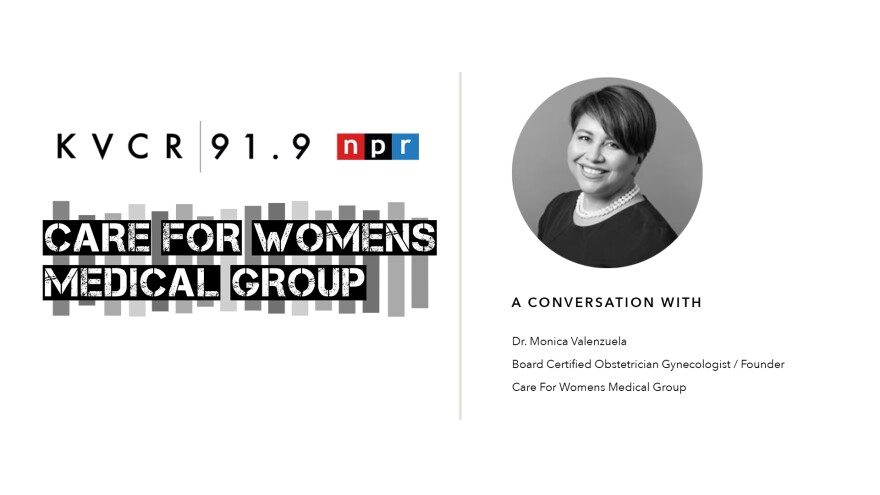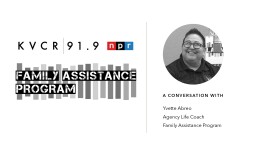Yvette Walker
With KVCR News, I'm Yvette Walker. This is IE Latino Voices where we invite representatives from Latino led and Latino serving organizations to share their stories and their impact in our region. Joining me today is Dr. Monica Valenzuela, board certified obstetrician gynecologist and one of the founders of Care for Womens Medical Group. Thank you so much for being with us today, Dr. Valenzuela.
Dr. Monica Valenzuela
Thank you, Yvette. Thanks for having me.
Yvette Walker
When you were practicing as an OBGYN, you made the choice to pursue the area of medicine that treats women on the other side of their child bearing years. What encouraged you to do that and what has resulted from it?
Dr. Monica Valenzuela
Sure, in my residency, we generally took care of pregnancy. And then I started seeing patients who were coming in complaining of hot flashes and night sweats and insomnia and anxiety. And I had no idea what to do with these women. So I was seeing these patients over and over again every day, and I was upset that I couldn't take care of them. And I kind of made it a mission for me to figure out menopause, because we live about 30 years of our life in menopause, and they should be good, you know, we should have a vibrant time of our life. And so that's where I'm at at this point and kind of where I started.
Yvette Walker
Well, I'm in agreement we should absolutely have the best years of our life on the other side of childbearing years. But in addition to that, there are some cultural barriers that exist within the Latino community that we were talking about in terms of what our grandmothers, our tias, our mothers, have shared with us, if anything. What do some of those cultural barriers look like?
Dr. Monica Valenzuela
Well, this is something that I see often because, you know, I'm Latina, and so I do get a lot of Latina patients, and they come in and they're like, you know, my mom never talked to me about this, and when I asked her about it, she said, Oh, that didn't happen to me. And I always say, everybody goes through menopause, nobody escapes it. She may not have had symptoms. You know, when it comes to women's health, reproduction, menopause, pap smears, mammograms, I think that that is a cultural thing that we just do not talk about. And it's not just in the Latino community. I see it in lots of different communities. I think that education is getting better, but I still think that it's something that is a little bit taboo.
Yvette Walker
What exists to allow women to experience a higher quality of life for patients that are going through perimenopause and menopause?
Dr. Monica Valenzuela
We're really lucky, because we are starting to have more and more data, more and more research, more and more evidence that hormone therapy is very safe for the majority of people. There's a myriad of options. There's gel, there's pills, there's spray, there's a patch, there's vaginal rings. So there's a lot of different options, and I think that everybody's going to have a little bit different combination of medication based on their treatment plans.
Yvette Walker
Aside from medication, are there lifestyle changes that can assist with the transition as well?
Dr. Monica Valenzuela
Yes, absolutely. What we're doing every day is so important, it's almost more important than the medication, because the medication is definitely going to help support and get rid of symptoms. But as far as longevity, as we start to lose muscle, we start to decrease our metabolism, and that's why we gain weight in menopause and perimenopause. And so making sure that you're exercising, making sure that you're strength training, because we don't want to lose that muscle. We want to try to build that muscle, and we can continue to do the things that we want to do as we get older, because we do have a lot of evidence that it helps with cognition and helps prevent dementia. What you're eating is really important. You know, are you eating a good diet? Are you focusing on your macronutrients? Are you looking at how much protein you're eating, because we want to support that muscle. Increasing your fiber is also recommended, and making sure that we're not eating a lot of processed food. And then the third thing that I like to emphasize is sleep. You want to try to stay off of a screen two hours before, so no blue light two hours before, trying not to eat two hours before you go to sleep, because it helps you go to sleep easier and sleep better.
Yvette Walker
For women that are listening, what is the best way to connect with you, Dr. Valenzuela?
Dr. Monica Valenzuela
I recently launched my social media presence, which patients have been asking me to do for a while. It's Dr. V's Menopause Minute on Instagram, and I will be posting education about menopause. It's evidence based and tips and tricks on how to get through this phase of life the best way we can and so that's a way to connect with me. Another way to connect with me is through my practice. I am one of the doctors at Care for Women's Medical Group. We have offices in Eastvale, Chino Hills, upland and Rancho, and you can reach us through our website at cfwmg.com. Our phone number is on the website, so that's probably the easiest way.
Yvette Walker
Thank you for sharing this wealth of insight, knowledge, tips and actionable items, as I mentioned, to really start to experience our best quality of life now and beyond our childbearing years.
Dr. Monica Valenzuela
Well, thank you so much for having me.
Yvette Walker
Join us again next week for IE Latino Voices, you can find this story and others on our website, at kvcrnews.org/IELatinoVoices. IE Latino Voices is produced by KVCR Public Media, and is funded by generous support from San Antonio Regional Hospital. Here for life. For KVCR News, I'm Yvette Walker.
Yvette Walker
Con KVCR News. Soy Yvette Walker. Les presento a IE Latino Voices, donde invitamos a representantes de organizaciones lideradas y al servicio de latinos a compartir sus historias y su impacto en nuestra región. Hoy me acompaña el Dr. Rohinder Sandhu, neumólogo de cuidados críticos de California Pulmonary Associates. Muchas gracias por estar con nosotros, Dr. Sandhu.
Dr. Rohinder Sandhu
Gracias por invitarme.
Yvette Walker
Dr. Sandhu, díganos exactamente qué es un neumólogo de cuidados críticos y lo qué hace.
Dr. Rohinder Sandhu
Un médico de cuidados críticos es un médico que atiende a un paciente grave con múltiples órganos afectados, ya sea respiratorio, cardíaco, neurológico, endocrino o hemodinámico, es decir, presión arterial baja, es decir, todos los sistemas del cuerpo no funcionan bien. Tenemos que pensar en integrar todo para ver cómo podemos mejorar la salud de la persona.
Yvette Walker
¿Ha observado tendencias preocupantes en la comunidad latina en cuanto a la salud pulmonar?
Dr. Rohinder Sandhu
No solo los latinos, creo que casi todos, definitivamente tenemos una gran preocupación por el humo del cigarrillo y sus consecuencias en los problemas respiratorios, ya sea la exacerbación del asma, el desarrollo de enfisema o el empeoramiento de la EPOC. Además, creo que el principal problema con el que lidiamos son los pacientes que no cuidan su salud. Al subir de peso, no hacen ejercicio. Todos mis pacientes que me consultan siempre me dicen: "Por favor, hagan ejercicio". Otra cosa que vimos durante la pandemia fue que las personas que se mantienen activas y hacen ejercicio definitivamente mejoraron su lucha contra el virus, se cuidaron y sobrevivieron.
Yvette Walker
Dr. Sandhu, ¿podría compartir información sobre las nuevas tecnologías y las opciones de tratamiento en medicina pulmonar?
Dr. Rohinder Sandhu
Hay muchas novedades que están surgiendo. Recientemente, hemos realizado una broncoscopia robótica. Hacemos eso todo el tiempo: broncoscopia convencional. Cuando la persona está enferma, no puedo determinar qué tipo de neumonía tiene. Le introduzco un endoscopio por la boca o la nariz hasta los pulmones y tomo una muestra, pero a veces esas broncoscopias solo pueden llegar a una o dos generaciones de tubos de respiración. Pero la patología que tenemos está muy lejos. Está más lejos en el área de los pulmones. Entonces, la broncoscopia robótica es algo avanzado, mínimamente invasiva, y los robots podrían ayudarnos a llegar a un nódulo que es muy, muy pequeño. Podríamos llegar a estos nódulos de un centímetro mucho más fácilmente, y el paciente no tiene que esperar. En el pasado, solíamos decir: "¿Sabes si el nódulo es demasiado pequeño? Hagamos otra tomografía computarizada en tres o seis meses para ver si aumenta de tamaño". La preocupación como médico, la preocupación como paciente, siempre es, ¿qué pasa si tengo cáncer? ¿Me estás diciendo que espere tres meses? Eso no les da tranquilidad, y eso, como médico, no me da tranquilidad a mí. Además, podríamos diagnosticar a alguien que podría tener, Dios no lo quiera, cáncer mucho antes. Eso es realmente importante. En segundo lugar, también podríamos detectar una infección, si se trata de alguna, pero es muy leve. No mejora. Podríamos lograrlo con esta broncoscopia robótica en una etapa temprana. También contamos con ecografías endobronquiales (EBA), con el bronquio y el ecógrafo en la parte superior, que podríamos colocar allí y tomar una imagen de los ganglios linfáticos para ver si hay algún agrandamiento. Y puedo hacer una biopsia para asegurarme de que el cáncer no se haya extendido a los ganglios linfáticos. Pero es mucho menos invasivo que abrir el pecho de mi paciente y luego darse cuenta de que el cáncer se ha propagado. Pero yo abrí el pecho. No fue necesario. Eso sería importante.
Yvette Walker
Es emocionante saber de esta tecnología avanzada, en particular en robótica, diseñada para crear un enfoque menos invasivo que brinde tranquilidad a sus pacientes. Dr. Sandhu, cuéntenos cómo la comunidad puede conectarse con usted, hacerle preguntas y aprender más sobre esta innovadora tecnología.
Dr. Rohinder Sandhu
Tenemos dos consultorios: uno en Upland y otro en Glendora. El número de teléfono es 626-914-5219. Si alguien me llama, día o noche, no me importa. Si hay algo que amo más que cualquier otra cosa en el mundo, después de mi esposo y mis hijos, es la medicina. Así que no me importa que me llamen.
Yvette Walker
Muchas gracias, Dr. Sandhu. Acompáñenos de nuevo la próxima semana en IE Latino Voices. Puede encontrar esta historia y otras en nuestro sitio web: KVCRnews.org/IELatinoVoices. IE Latino Voices es una producción de KVCR Public Media y está financiada por el generoso apoyo del Hospital Regional de San Antonio. Aquí para siempre. Para KVCR News, soy Yvette Walker.







